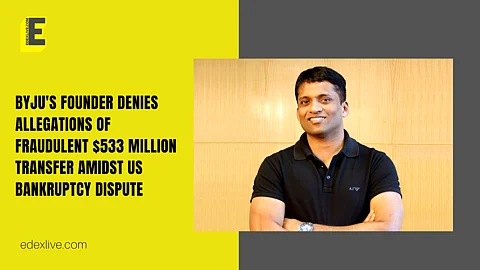

Byju Raveendran, the founder of BYJU'S, an Indian education company that once soared to success, has denied orchestrating a fraudulent scheme to transfer $533 million away from the United States (US) lenders. This was stated in a report published by Hindustan Times.
As a judge reviewed lenders’ claims of fraudulent transfer against the company, Raveendran presented his account of the events for the first time in court, explaining what had happened to the money that lenders had been trying to trace for over a year.
According to Raveendran, the company secured a $1.2 billion loan nearly three years ago, intending to use the majority of the funds for international expansion. He stated that more than $200 million was allocated to marketing, including sponsoring the FIFA World Cup in Qatar in 2022 and appointing football star Lionel Messi as the brand ambassador. Almost $300 million was directed to covering losses in Tangible Play businesses.
“However, just as we were poised to see the returns on these strategic investments, we were hit by a liquidity crunch,” Raveendran said in a Wednesday filing in the US Bankruptcy Court in Wilmington, Delaware.
He argued that the disputed $533 million, which lenders claim was transferred offshore to entities connected to him, was used for a "legitimate commercial purpose."
On Wednesday, lenders, represented by Glas Trust Company, contended in court that BYJU'S, Raveendran’s brother, and a Miami hedge fund that previously managed the company’s finances, should be held responsible for moving the funds out of reach of creditors. If US Bankruptcy Judge John Dorsey sides with the lenders, the company, the hedge fund, and Raveendran’s brother, Riju Ravindran, could be ordered to repay the funds.
Judge Dorsey hinted that he was “likely” to rule against the hedge fund, though he did not indicate how he might rule regarding BYJU'S or Raveendran. He criticised Raveendran for transferring part of the $533 million in March 2023, despite allegedly losing the authority to do so.
“That seems like pretty much straight up fraud to me,” Dorsey remarked.
The judge also dismissed Raveendran’s recent court filing, noting that the BYJU'S founder had ample time to explain the whereabouts of the funds but chose not to do so.
Lawyers representing BYJU'S, Raveendran, and the hedge fund urged the judge to withhold any ruling, arguing that they had not yet gathered the necessary information to defend themselves. However, Dorsey appeared to reject the request, indicating his intention to issue a written ruling.
The lenders disputed Raveendran’s claims, accusing BYJU'S of manipulating its accounts. “The Raveendran brothers engaged in a game of charades,” said Glas attorney Ravi Subramanian Shankar in court, accusing them of concealing the destination of the funds.
Lenders have viewed the so-called Alpha Funds as their best chance of recovering part of the $1.2 billion loan they extended to the company during the COVID-19 lockdowns, a period which saw the online education platform become one of India’s most valuable start-ups.
The two parties have been engaged in a protracted legal battle in both state and federal courts, seeking clarity on the whereabouts of the funds. According to the lenders, Raveendran told their advisers in a meeting that “the money is someplace the lenders will never find it,” a claim that was later recorded in a court filing.
Raveendran, however, denied making such a statement.
“The entire case of fraud and siphoning of money is based on one statement that their representative wrote on a paper napkin and attributed to me,” he stated, clarifying that during the meeting, he had intended to explain that the funds would be used for their intended purpose.
In his declaration, Raveendran detailed how the company needed to utilise the loan proceeds for its international expansion swiftly, which led to agreements with OCI, a UK-based logistics firm responsible for Information Technology (IT) procurement and advertising services.
When BYJU'S failed to repay what it owed, OCI exercised its “right of set-off” against the Alpha Funds.
“Neither I, nor any of the founders of T&L (BYJU'S borrowing unit) has personally received any portion of the Alpha Funds or any of the funds disbursed under the credit agreement,” Raveendran asserted in his filing.
In contrast, the lenders' attorney alleged that BYJU'S first transferred the $533 million to a small hedge fund in Miami, which had less than $10 million in assets at the time. The hedge fund then transferred the money to OCI in exchange for unsecured promissory notes.
According to Shankar, OCI spent the funds, reducing the promissory notes by the same amount. He argued that the financial structure was designed to record the $533 million as an asset rather than a liability.
The case, BYJU’S Alpha Inc, is currently being heard in the US Bankruptcy Court for the District of Delaware.
